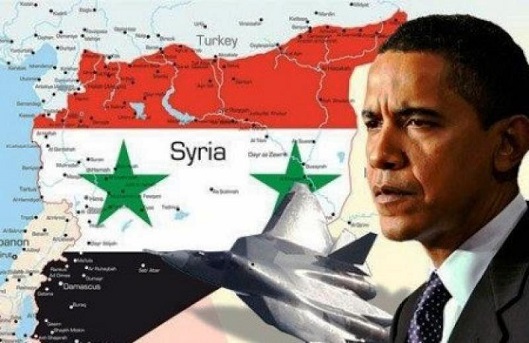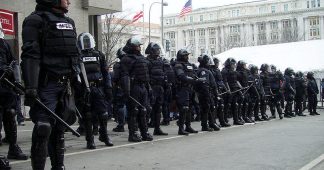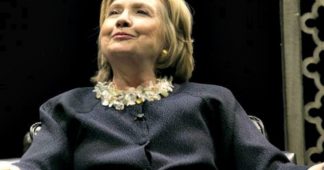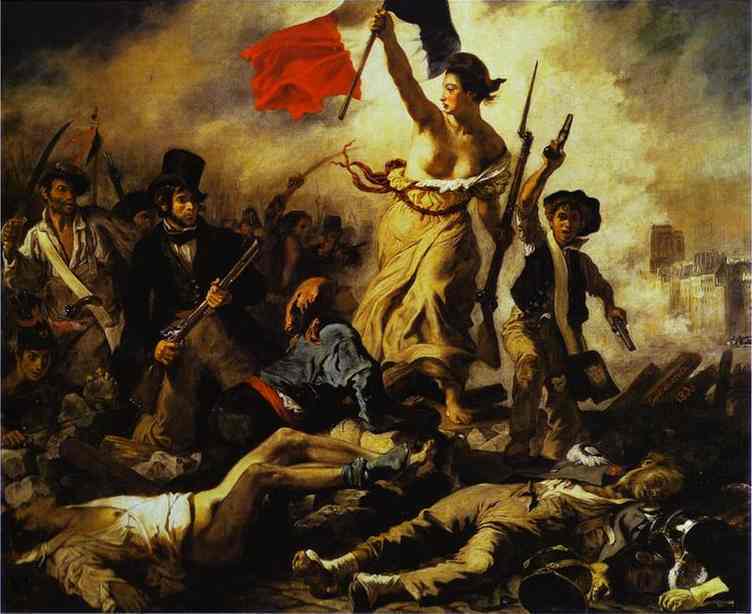by Dan Sanchez
Wednesday, two shocking videos of police officers fatally shooting civilians (Alton Sterling and Philando Castile) surfaced. The day before, many were appalled to hear the Director of the FBI announce that Hillary Clinton would not be charged for mishandling classified information. The two events may seem unrelated, but at bottom, they concern the same fundamental problem: impunity.
Impunity is the essence of power. What, after all, is power? Is it simply the capacity to exert unjust force? The ability to impress one’s will upon the flesh or belongings of another? No, it’s more than that.
Most anyone can wield unjust force. Anyone could walk out onto the street right now and exert their will on somebody weaker: say, pushing over an old lady or stealing candy from a baby. And the toughest, or most heavily-armed guy in town can strong-arm just about any other single person.
But isolated incidents of aggression do not constitute power. The “reign” of the rogue rampager is generally short-lived. It only lasts until the community recognizes him as the menace to society that he is and neutralizes him.
Power isn’t simply about the exertion of unjust force. It is about what happens next, after the exertion. Does the perpetrator generally get away with, or not? Systematically getting away with it – or impunity – is where power truly lies. And that is what makes agents of the State different from any other bully. State agents can violate rights with reliable impunity because a critical mass of the public considers the aggression of state agents to be exceptionally legitimate. Impunity is power, and as Lord Acton said, power corrupts.
The Impunity of the Badge
State impunity is at the root of the problem of police violence. As agents of the exalted State, the police are seen as paladins of public order. The populace grants cops a special dispensation to commit violence that would be considered criminal if perpetrated by anybody else. This privilege is enshrined in law most clearly as the doctrine of “qualified immunity.” As Evan Bernick of the Institute for Justice wrote:
In the 1967 case of Pierson v. Ray, the Supreme Court held that police officers sued for constitutional violations can raise ‘qualified immunity’ as a defense, and thereby escape paying out of their own pockets, even if they violated a person’s constitutional rights.
When victims of police violence or their heirs seek redress and are awarded monetary payments, it is taxpayers, and not the cops, who pick up the tab. Police officers are rarely even prosecuted for violence inflicted while they’re on the clock. The worst that an offending officer can generally expect to face is getting fired, but he will more likely just get a paid suspension.
Thus insulated from responsibility, officer treatment of “mundanes” is predictably often grossly irresponsible. Confident in being sheltered from consequences by their “blue privilege,” officers are far more prone to indulge in lethal cowardice: to place “officer safety” so far above civilian rights that they are willing to gun down a stranger at the slightest whiff of potential danger. Alton Sterling and Philando Castile each carried a gun, as they have the natural right to do. Neither threatened the officers with his weapon, or even brandished it. Yet in both cases, merely becoming aware of the guns sent a cop into a murderous panic. Both Sterling and Castile were fatally shot multiple times in the chest.
The Impunity of High Office
State impunity not only corrupts the regime’s low-level enforcers, but its elite policy makers as well. The FBI let Hillary Clinton off the hook for secrecy violations she committed as Secretary of State, even though these were much more egregious than violations that have earned lower-level personnel decades in prison. She used technology that was more open to being compromised by spies and hackers, while at the same less open to legal and public scrutiny.
But the kinds of activities she was hiding are far more criminal than the fact that she hid them. As Secretary of State, Hillary Clinton played a key role in bringing war to such places as Libya, Syria, and Honduras, and in escalating the war in Afghanistan. She is complicit in causing untold death and misery.
Yet, thanks to her connections and her position in the state power apparatus, she faces no consequences for her crimes, and is free to acquire even more immunity and power as a likely President of the United States.
It is the “sovereign immunity” she enjoys as an officeholder that has made Hillary Clinton so reckless and cavalier about the havoc she has wreaked around the world. If she thought she might ever be held accountable for upending entire countries, she would have likely been far less warlike in her policies.
From policing to foreign policy, impunity corrupts, and absolute impunity corrupts absolutely.
Dan Sanchez is the Digital Content Manager at the Foundation for Economic Education (FEE), developing educational and inspiring content for FEE.org, including articles and courses.











